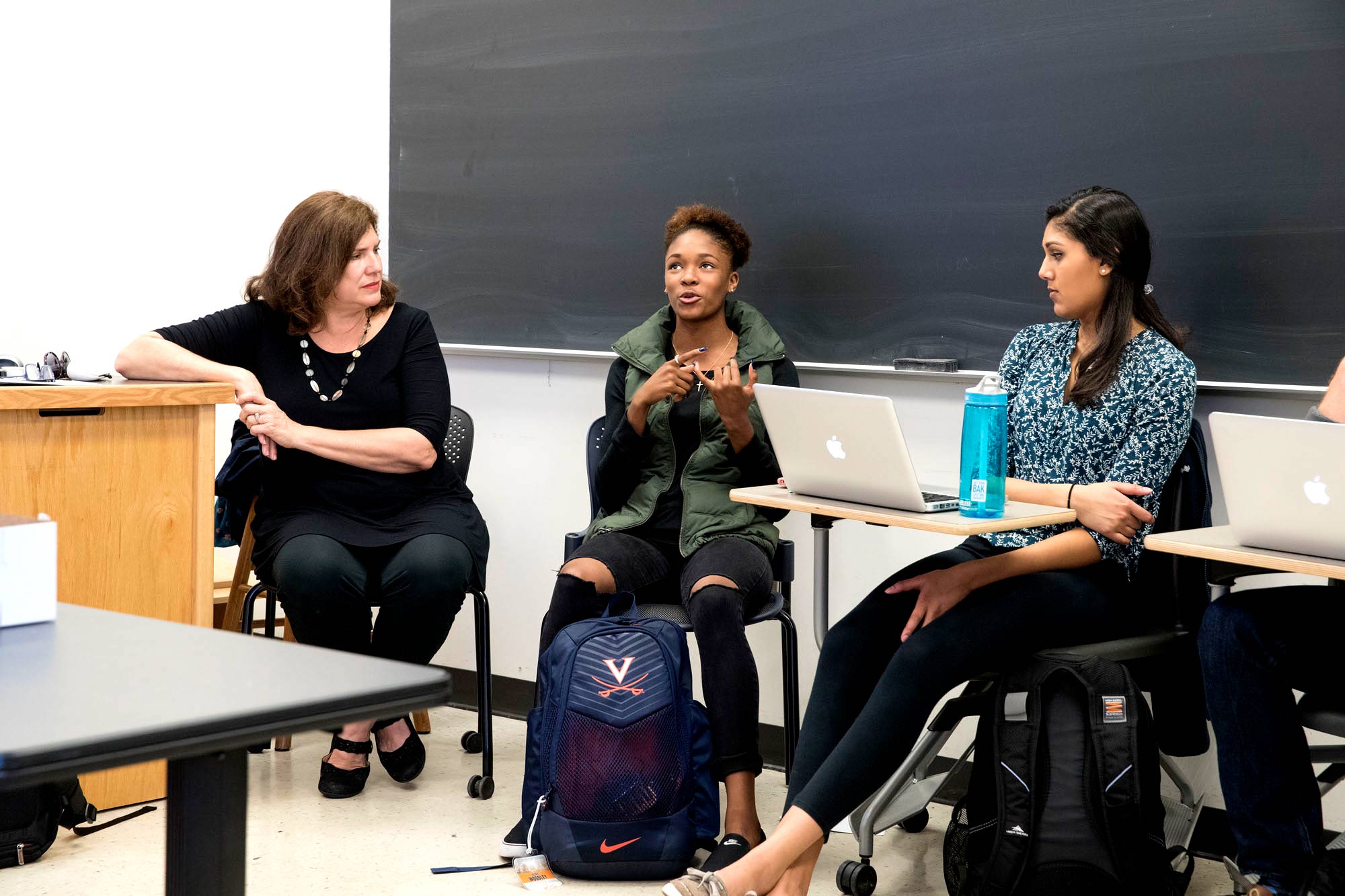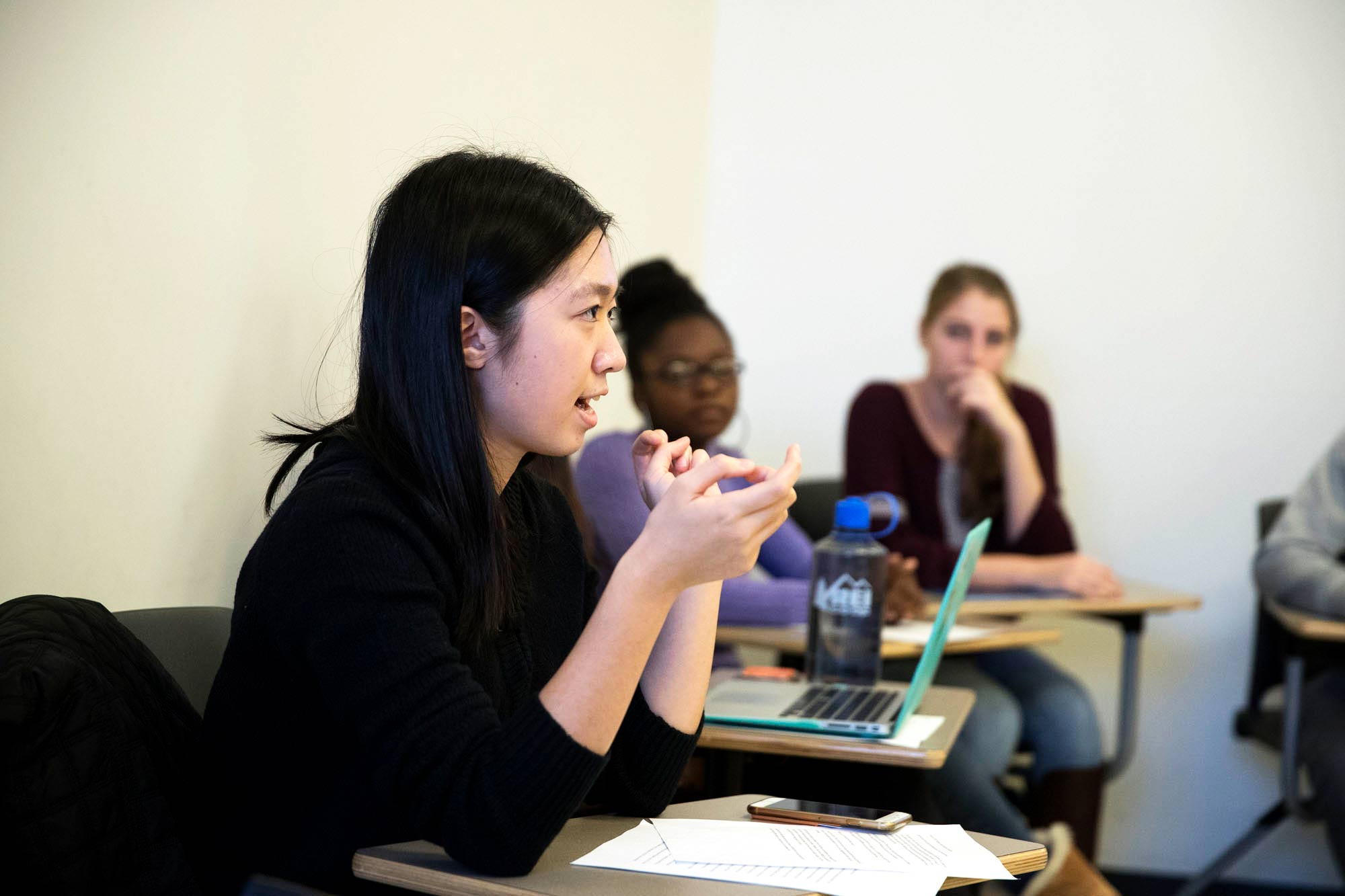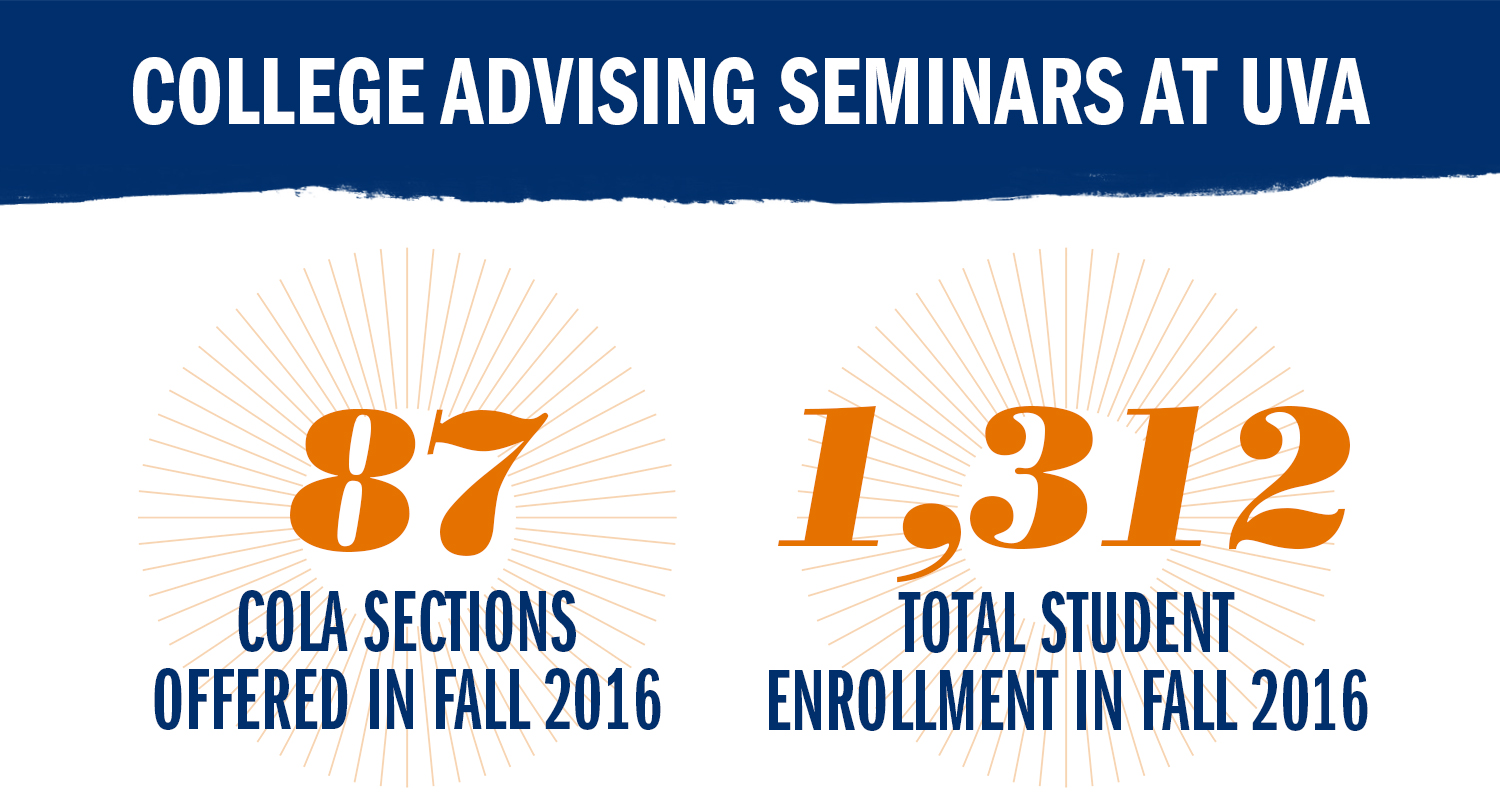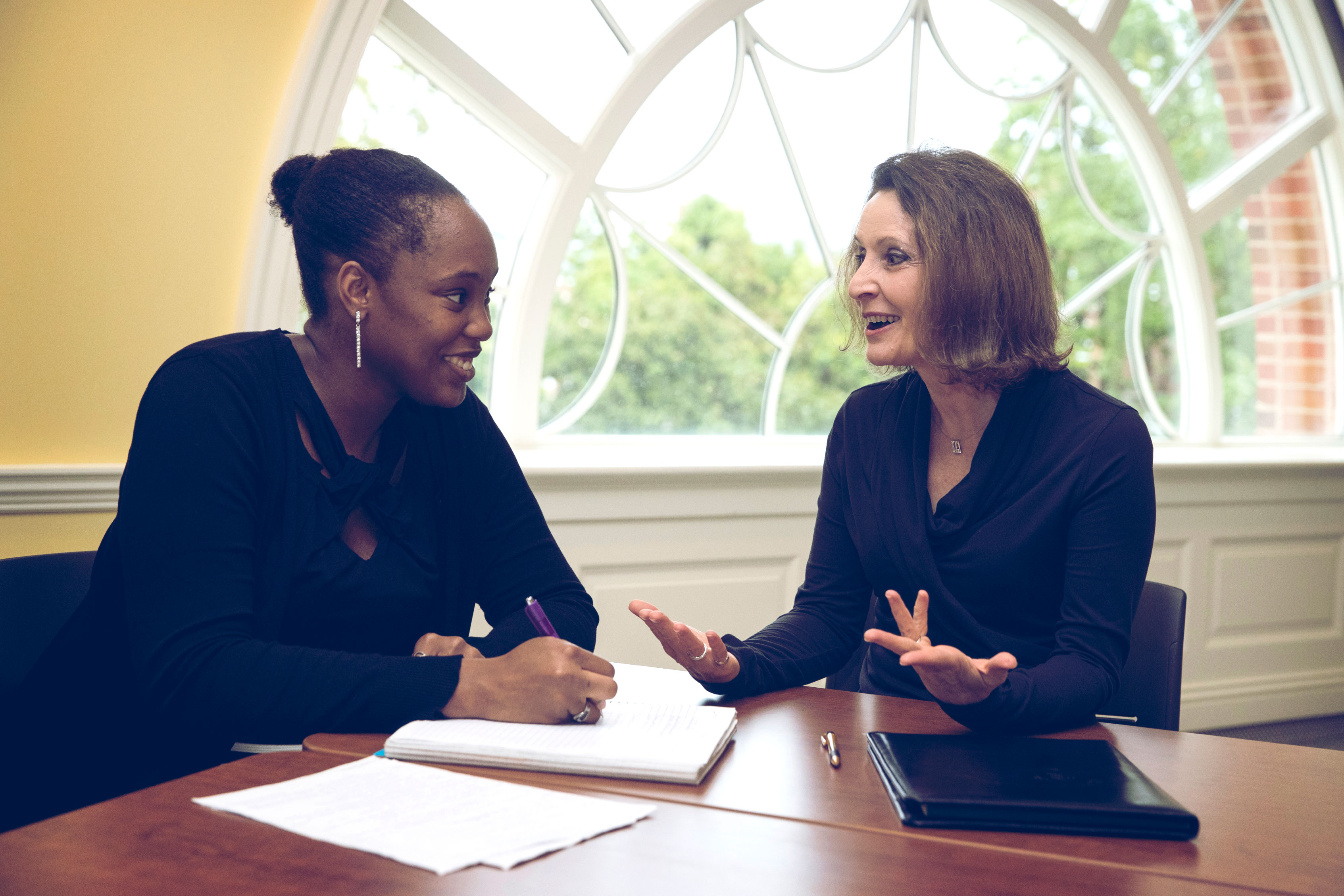Looking back on their college careers, former students likely will not remember the exact title of every term paper they wrote or the contents of every reading. Many, however, can vividly recall the advice and the professors that shaped those four critical years.
For fourth-year University of Virginia student Aubree Surrency, that professor is LaVae Hoffman, an associate professor of speech language pathology in the Curry School of Education. Hoffman became Surrency’s mentor at a particularly vulnerable time during the student’s second year, when she was deciding to switch from a pre-med track to UVA’s speech pathology program.
“That was a very crucial time because I realized that I had to pick one and I was trying to decide which one would be best for me and my life,” said Surrency, sitting in Hoffman’s office last semester.
Two years after Hoffman and Surrency were paired through the Office of African-American Affairs Faculty-Student Mentoring Program, they continue to meet regularly. Surrency, who hopes to work in a children’s hospital eventually, has worked in Hoffman’s lab for a year and half, managing online outreach for the professor’s research on child language disorders. A major part of her role is reaching out to parents participating in online surveys.

Janet Horne, left, listens as first-year student Alexis Woodley, center, discusses what she learned during her first semester on Grounds.
“When you get those responses, you feel like you are doing something really beneficial,” Surrency said. “I had never done any lab work before this, and I think it is really interesting.”
Hoffman is also assisting Surrency as she applies to speech pathology master’s degree programs.
“I would like to stay in Virginia, but I am also considering returning to New York,” said Surrency, who grew up in Long Island. “After seeing how parents are advocating for their kids through Professor Hoffman’s research, I would really like to work with kids in a hospital setting and eventually, in schools.”
She and Hoffman have been discussing factors to consider when choosing a graduate school program, and strategies for writing personal statements or preparing for the GRE.
“Once you have been through the process of getting advanced degrees and getting your clinical practice set up, you tend to forget that there was a time in your life when you did not know how to do those things,” Hoffman said. “Mentoring lets you help someone who is in that position, and it is so delightful and easy to do.”
The Office of African-American Affairs mentoring program was established more than 20 years ago and is just one of many examples of formal and informal mentoring on Grounds. Many students continue to check in with a favorite professor, take multiple classes with them and ask for advice during office hours. Older students are paired with an adviser in their major, while first- and second-year students are assigned school-specific advisers and can enroll in one-credit College Advising Seminars.

First-year student Yayi Feng, above, and other students talked about different resources, groups and events on Grounds that they discovered through Horne’s course.
Third-year student Cat Wyatt met one of her mentors, associate French professor Janet Horne, during a College Advising Seminar two years ago. Horne’s class, “Going Global (Right Here on Grounds),” combines discussions of international policy with assignments that expose students to the many cultures represented at UVA and the opportunities for global study and research available to them. Wyatt said the class validated her decision to major in international relations and introduced resources she might have missed.
“It opened my eyes to so many different routes I could take on Grounds,” said Wyatt, who continued to meet with Horne after her course concluded. “Professor Horne is definitely one of my mentors now.”
Wyatt returned to Horne’s classroom to meet the latest group of first-year students enrolled in her seminar. Each year, Horne asks some of her former students to come back and speak to her class, telling the new students about experiences they have loved at UVA.
“I try to encourage each of them, in their own individual way, to get out there and discover things on Grounds,” Horne said.
Horne’s class was one of more than 80 one-credit advising seminars offered in the fall. Each paired top faculty members with about 20 first-year students for courses that are 80 percent academic content and 20 percent advising content. The faculty members serve as the designated academic adviser for each student, helping them decide which classes to take, consider different majors and learn more about the resources available at UVA. With this model, students who might otherwise only see their academic adviser once per semester see him or her several times per week.
That level of accessibility helps build strong faculty-student relationships like the mentorship that Wyatt still enjoys, two years after taking Horne’s class.
“I love the COLA class because I get to meet with the students I am advising 14 times per semester. I have gotten to know each one of them and they have gotten to know each other,” Horne said. “I feel like it is a real privilege. That first year, that first-semester experience, can help set the direction of their time at UVA.”

COLA By The Numbers
On the last day of classes in 2016, Horne and her students reflected on their transition from high school to college.
“When we started this class in August, you had just arrived at UVA. Some of you were quietly freaking out, but you were having lots of good experiences,” Horne told the students. “Now, you feel a lot more integrated and you know the ropes. That’s great.”
In their final presentations, students talked about how the class had helped them learn more about the community they had just joined.
One student, who came to UVA from China, mentioned getting involved in the VISAS program, which pairs international students with peers who meet with them each week to work on English language skills.
Several spoke about meeting with groups like the International Rescue Committee, which visited Horne’s class to talk about the refugee community in Charlottesville. Some students attended a public lecture by Khizr Khan, father of U.S. Army Capt. Humayun Khan, a UVA alumnus killed in Iraq in 2004. The elder Khan spoke at the Democratic National Convention and later visited UVA as a guest of the Miller Center, a nonpartisan group that regularly hosts marquee political speakers.
Other students recalled attending festivals, dinners and other events held by cultural groups on Grounds.
“Just by taking that one step, I ended up learning so much more about so many global cultures right here on Grounds,” said first-year student Sofia Espinosa, who spoke about dancing at a Culture Festival put on by UVA’s Organization for Young Filipino Americans.
Horne reiterated that message as she closed the class.
“Just take those small steps in a way that feels genuine to who you are and then when you have big decisions to make, it will hopefully make those a little easier,” Horne said.
She reminded them that she would be there whenever they needed to talk about those decisions.
“Whenever I see an email from one of you, I will answer it right away. I am always available to talk on the phone or find a time to meet,” she said.
Finally, she reflected on the progress that each of them had made working with her and with each other as they acclimated to UVA.
“It is obvious that they are no longer in the same place that they were when they arrived on Grounds,” she said after the class. “That is what education should be about. This class is a little microcosm of what UVA is about, what liberal arts education can be.”
Media Contact
Article Information
February 8, 2017
/content/why-finding-faculty-mentor-might-be-best-thing-you-do-grounds

